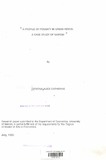| dc.description.abstract | This study estimated the extent and depth of urban poverty as well as the socio-economic characteristics of the urban poor in Nairobi in Kenya. The study was justified in terms of yielding useful policy data for the direct benefit of the urban poor population. The extent and depth of urban poverty in Nairobi was measured by the widely used indices including estimating the incidence of poverty and the poverty gap as well as obtaining a profile of the poor. Estimation of the indices and socio-economic characteristics was based on secondary data from the Urban Household. Budget Survey 1982/83 (Central Bureau of statistics). The socio-economic characteristics of the urban poor covered include household size and composition, household expenditures, education of head of household, etc. Various statistical tests of significance of the difference between the socio-economic characteristics of the poor and rich urban households were conducted. The main finding of the study was that the socio-economic characteristics of the urban poor differed from those of the non-poor. In particular, the poor urban sub-population had lower levels of education, were occupied in lower paying employment, had smaller sized households and spent larger proportions of their expenditure on food than on non-food products. The policy implication of, the findings of the study was that the poor need to be encouraged to retain their children in school for longer durations. Further policy implications were the introduction of prevocational training, introduction of multiple shifts in industry, and stabilization of the prices of basic staple foodstuffs, to ensure that they are affordable to the poor. | en |

